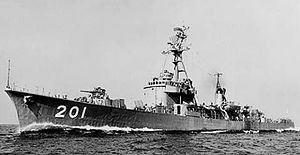JDS Akebono (DE-201)
 JDS Akebono (DE-201)
| |
| Class overview | |
|---|---|
| Preceded by | Asahi class |
| Succeeded by | Ikazuchi class |
| History | |
| Name |
|
| Builder | Ishikawajima, Tokyo |
| Laid down | 10 December 1954 |
| Launched | 30 October 1955 |
| Commissioned | 20 March 1956 |
| Decommissioned | 1976 |
| Stricken | 1981 |
| General characteristics [1] | |
| Type | Destroyer escort |
| Displacement |
|
| Length | 91.8 m (301 ft 2 in) pp |
| Beam | 8.5 m (27 ft 11 in) |
| Draft | 3.4 m (11 ft 2 in) |
| Propulsion |
|
| Speed | 28 kn (52 km/h; 32 mph) |
| Complement | 193 |
| Sensors and processing systems |
|
| Armament |
|
JDS Akebono (DE-201) was a destroyer escort (or frigate) of the Japanese Maritime Self-Defense Force. Akebono was one of the first indigenous Japanese warships to be built following World War II. Akebono was laid down in 1954 as a steam turbine powered "B type" ASW escort, the only ship of its class, for comparison with two similar diesel powered ships, the Ikazuchi-class destroyer escorts. Akebono entered service in 1956 and remained in use until 1976.
Design and construction
[edit]The Japanese Marine Safety Force (later to become the Japanese Maritime Self-Defense Force) authorised the purchase of three "B type" escort vessels as part of the Financial Year 1953 programme.[nb 1] Of the three ships, two of which were to be powered by diesel engines (the Ikazuchi class) and the third by steam turbines, to be called Akebono.[1]
The equipment of the three escorts was similar, with two American 3-inch (76 mm) guns, four 40 mm Bofors guns, a Hedgehog anti-submarine projector and eight K-gun depth charge launchers. Akebono had a twin-shaft machinery installation, with geared steam turbines producing 18,000 shaft horsepower (13,000 kW) which could propel the ship at a top speed of 28 knots (52 km/h; 32 mph) compared with the 25 knots (46 km/h; 29 mph) of the less powerful Ikazuchi class.[1]
Akebono was laid down at the Ishikawajima Tokyo shipyard on 10 December 1954. She was launched on 15 October 1955 and completed on 20 March 1956.[3]
Operations
[edit]Akebono was re-armed in March 1958, when her original 3-inch guns were replaced by more modern, autoloading 3 inch guns, with 1 Bofors gun, four K-guns also removed.[1] Akebono was discarded in 1976.[1]
Notes
[edit]Citations
[edit]References
[edit]- Blackman, Raymond V. B. Jane's Fighting Ships 1960–61. London: Sampson Low, Marston & Co., 1960.
- Gardiner, Robert and Stephen Chumbley. Conway's All The World's Fighting Ships 1947–1995. Annapolis, Maryland, USA: Naval Institute Press, 1995. ISBN 1-55750-132-7.
